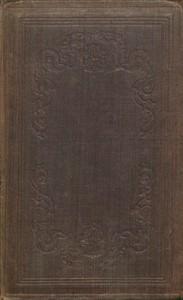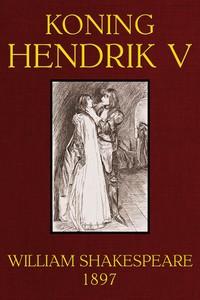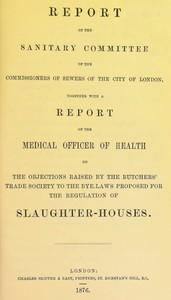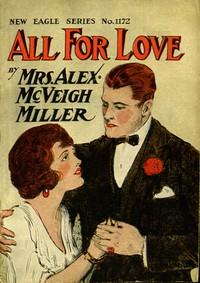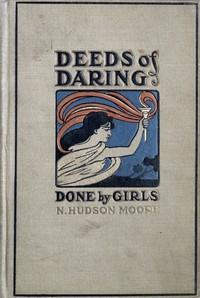|
|
Read this ebook for free! No credit card needed, absolutely nothing to pay.Words: 88640 in 15 pages
This is an ebook sharing website. You can read the uploaded ebooks for free here. No credit cards needed, nothing to pay. If you want to own a digital copy of the ebook, or want to read offline with your favorite ebook-reader, then you can choose to buy and download the ebook.

: The Useful Arts Employed in the Construction of Dwelling Houses. Second Edition by Anonymous - Architecture Domestic; Building materials; Dwellings Design and construction@FreeBooksThu 08 Jun, 2023 Index 285 A BOOK OF PREFACES JOSEPH CONRAD "Under all his stories there ebbs and flows a kind of tempered melancholy, a sense of seeking and not finding...." I take the words from a little book on Joseph Conrad by Wilson Follett, privately printed, and now, I believe, out of print. They define both the mood of the stories as works of art and their burden and direction as criticisms of life. Like Dreiser, Conrad is forever fascinated by the "immense indifference of things," the tragic vanity of the blind groping that we call aspiration, the profound meaninglessness of life--fascinated, and left wondering. One looks in vain for an attempt at a solution of the riddle in the whole canon of his work. Dreiser, more than once, seems ready to take refuge behind an indeterminate sort of mysticism, even a facile supernaturalism, but Conrad, from first to last, faces squarely the massive and intolerable fact. His stories are not chronicles of men who conquer fate, nor of men who are unbent and undaunted by fate, but of men who are conquered and undone. Each protagonist is a new Prometheus, with a sardonic ignominy piled upon his helplessness. Each goes down a Greek route to defeat and disaster, leaving nothing behind him save an unanswered question. I can scarcely recall an exception. Kurtz, Lord Jim, Razumov, Nostromo, Captain Whalley, Yanko Goorall, Verloc, Heyst, Gaspar Ruiz, Almayer: one and all they are destroyed and made a mock of by the blind, incomprehensible forces that beset them. This conviction that human life is a seeking without a finding, that its purpose is impenetrable, that joy and sorrow are alike meaningless, you will see written largely in the work of most great creative artists. It is obviously the final message, if any message is genuinely to be found there, of the nine symphonies of Ludwig van Beethoven, or, at any rate, of the three which show any intellectual content at all. Mark Twain, superficially a humourist and hence an optimist, was haunted by it in secret, as Nietzsche was by the idea of eternal recurrence: it forced itself through his guard in "The Mysterious Stranger" and "What is Man?" In Shakespeare, as Shaw has demonstrated, it amounts to a veritable obsession. And what else is there in Balzac, Goethe, Swift, Moli?re, Turgenev, Ibsen, Dostoyevsky, Romain Rolland, Anatole France? Or in the Zola of "L'Assomoir," "Germinal," "La D?b?cle," the whole Rougon-Macquart series? Or in the Hauptmann of "Fuhrmann Henschel," or in Hardy, or in Sudermann? ... The younger men in all countries, in so far as they challenge the current sentimentality at all, seem to move irresistibly toward the same disdainful skepticism. Consider the last words of "Riders to the Sea." Or Gorky's "Nachtasyl." Or Frank Norris' "McTeague." Or Stephen Crane's "The Blue Hotel." Or the ironical fables of Dunsany. Or Dreiser's "Jennie Gerhardt." Or George Moore's "Sister Teresa." I have mentioned Ibsen. A glance at the literature he has spawned in the vulgate is enough to show how much his falser aspects have intrigued the American mind and how little it has reacted to his shining skill as a dramatic craftsman--his one authentic claim upon fame. Read Jennette Lee's "The Ibsen Secret," perhaps the most successful of all the Ibsen gemaras in English, if you would know the virulence of the national appetite for bogus revelation. And so in all the arts. Whatever is profound and penetrating we stand off from; whatever is facile and shallow, particularly if it reveal a moral or mystical color, we embrace. Ibsen the first-rate dramatist was rejected with indignation precisely because of his merits--his sharp observation, his sardonic realism, his unsentimental logic. But the moment a meretricious and platitudinous ethical purpose began to be read into him--how he protested against it!--he was straightway adopted into our flabby culture. Compare Hauptmann and Brieux, the one a great artist, the other no more than a raucous journalist. Brieux's elaborate proofs that two and two are four have been hailed as epoch-making; one of his worst plays, indeed, has been presented with all the solemn hocus-pocus of a religious rite. But Hauptmann remains almost unknown; even the Nobel Prize did not give him a vogue. Run the roll: Maeterlinck and his languishing supernaturalism, Tagore and his Asiatic wind music, Selma Lagerl?f and her old maid's mooniness, Bernstein, Molnar and company and their out-worn tricks--but I pile up no more names. Consider one fact: the civilization that kissed Maeterlinck on both cheeks, and Tagore perhaps even more intimately, has yet to shake hands with Anatole France.... And, in America, of nearly five out of five. Winston Churchill may serve as an example. He is a literary workman of very decent skill; the native critics speak of him with invariable respect; his standing within the craft was shown when he was unanimously chosen first president of the Authors' League of America. Examine his books in order. They proceed steadily from studies of human character and destiny, the proper business of the novelist, to mere outpourings of social and economic panaceas, the proper business of leader writers, chautauquas rabble-rousers and hedge politicians. "The Celebrity" and "Richard Carvel," within their limits, are works of art; "The Inside of the Cup" is no more than a compendium of paralogy, as silly and smattering as a speech by William Jennings Bryan or a shocker by Jane Addams. Churchill, with the late Jack London to bear him company, may stand for a large class; in its lower ranks are such men as Reginald Wright Kauffman and Will Levington Comfort. Still more typical of the national taste for moral purpose and quack philosophy are the professional optimists and eye-dimmers, with their two grand divisions, the boarding-school romantics and the Christian Endeavor Society sentimentalists. Of the former I give you George Barr McCutcheon, Owen Wister, the late Richard Harding Davis, and a horde of women--most of them now humanely translated to the moving pictures. Of the latter I give you the fair authors of the "glad" books, so gigantically popular, so lavishly praised in the newspapers--with the wraith of the later Howells, the virtuous, kittenish Howells, floating about in the air above them. No other country can parallel this literature, either in its copiousness or in its banality. It is native and peculiar to a civilization which erects the unshakable certainties of the misinformed and quack-ridden into a national way of life.... But is the Conrad I here describe simply a new variety of moralist, differing from the general only in the drift of the doctrine he preaches? Surely not. He is no more a moralist than an atheist is a theologian. His attitude toward all moral systems and axioms is that of a skeptic who rejects them unanimously, even including, and perhaps especially including, those to which, in moments of aesthetic detachment, he seems to give a formal and resigned sort of assent. It is this constant falling back upon "I do not know," this incessant conversion of the easy logic of romance into the harsh and dismaying logic of fact, that explains his failure to succeed as a popular novelist, despite his skill at evoking emotion, his towering artistic passion, his power to tell a thumping tale. He is talked of, he brings forth a mass of punditic criticism, he becomes in a sense the fashion; but it would be absurd to say that he has made the same profound impression upon the great class of normal novel-readers that Arnold Bennett once made, or H. G. Wells, or William de Morgan in his brief day, or even such cheap-jacks as Anthony Hope Hawkins and William J. Locke. His show fascinates, but his philosophy, in the last analysis, is unbearable. And in particular it is unbearable to women. One rarely meets a woman who, stripped of affection, shows any genuine enthusiasm for a Conrad book, or, indeed, any genuine comprehension of it. The feminine mind, which rules in English fiction, both as producer and as consumer, craves inevitably a more confident and comforting view of the world than Conrad has to offer. It seeks, not disillusion, but illusion. It protects itself against the disquieting questioning of life by pretending that all the riddles have been solved, that each new sage answers them afresh, that a few simple principles suffice to dispose of them. Women, one may say, have to subscribe to absurdities in order to account for themselves at all; it is the instinct of self-preservation which sends them to priests, as to other quacks. This is not because they are unintelligent, but rather because they have that sharp and sure sort of intelligence which is instinctive, and which passes under the name of intuition. It teaches them that the taboos which surround them, however absurd at bottom, nevertheless penalize their courage and curiosity with unescapable dudgeon, and so they become partisans of the existing order, and, per corollary, of the existing ethic. They may be menaced by phantoms, but at all events these phantoms really menace them. A woman who reacted otherwise than with distrust to such a book as "Victory" would be as abnormal as a woman who embraced "Jenseits von Gut und B?se" or "The Inestimable Life of the Great Gargantua." I used to wonder why Conrad never tackled a straight-out story of adultery under Christianity, the standard matter of all our more pretentious fiction and drama. I was curious to see what his ethical agnosticism would make of it. The conclusion I came to at first was that his failure marked the limitations of his courage--in brief, that he hesitated to go against the orthodox axioms and assumptions in the department where they were most powerfully maintained. But it seems to me now that his abstinence has not been the fruit of timidity, but of disdain. He has shied at the hypothesis, not at its implications. His whole work, in truth, is a destructive criticism of the prevailing notion that such a story is momentous and worth telling. The current gyneolatry is as far outside his scheme of things as the current program of rewards and punishments, sins and virtues, causes and effects. He not only sees clearly that the destiny and soul of man are not moulded by petty jousts of sex, as the prophets of romantic love would have us believe; he is so impatient of the fallacy that he puts it as far behind him as possible, and sets his conflicts amid scenes that it cannot penetrate, save as a palpable absurdity. Love, in his stories, is either a feeble phosphorescence or a gigantic grotesquerie. In "Heart of Darkness," perhaps, we get his typical view of it. Over all the frenzy and horror of the tale itself floats the irony of the trusting heart back in Brussels. Here we have his measure of the master sentimentality of them all.... As for Conrad the literary craftsman, opposing him for the moment to Conrad the showman of the human comedy, the quality that all who write about him seem chiefly to mark in him is his scorn of conventional form, his tendency to approach his story from two directions at once, his frequent involvement in apparently inextricable snarls of narrative, sub-narrative and sub-sub-narrative. "Lord Jim," for example, starts out in the third person, presently swings into an exhaustive psychological discussion by the mythical Marlow, then goes into a brisk narrative at second hand, and finally comes to a halt upon an unresolved dissonance, a half-heard chord of the ninth: "And that's the end. He passes away under a cloud, inscrutable at heart, forgotten, unforgiven, and excessively romantic." "Falk" is also a story within a story; this time the narrator is "one who had not spoken before, a man over fifty." In "Amy Foster" romance is filtered through the prosaic soul of a country doctor; it is almost as if a statistician told the tale of Horatius at the bridge. In "Under Western Eyes" the obfuscation is achieved by "a teacher of languages," endlessly lamenting his lack of the "high gifts of imagination and expression." In "Youth" and "Heart of Darkness" the chronicler and speculator is the shadowy Marlow, a "cloak to goe inbisabell" for Conrad himself. In "Chance" there are two separate stories, imperfectly welded together. Elsewhere there are hesitations, goings back, interpolations, interludes in the Socratic manner. And almost always there is heaviness in the getting under weigh. In "Heart of Darkness" we are on the twentieth page before we see the mouth of the great river, and in "Falk" we are on the twenty-fourth before we get a glimpse of Falk. "Chance" is nearly half done before the drift of the action is clearly apparent. In "Almayer's Folly" we are thrown into the middle of a story, and do not discover its beginning until we come to "An Outcast of the Islands," a later book. As in structure, so in detail. Conrad pauses to explain, to speculate, to look about. Whole chapters concern themselves with detailed discussions of motives, with exchanges of views, with generalizations abandoned as soon as they are made. Even the author's own story, "A Personal Record" starts near the end, and then goes back, halting tortuously, to the beginning. In the eyes of orthodox criticism, of course, this is a grave fault. The Kipling-Wells style of swift, shouldering, button-holing writing has accustomed readers and critics alike to a straight course and a rapid tempo. Moreover, it has accustomed them to a forthright certainty and directness of statement; they expect an author to account for his characters at once, and on grounds instantly comprehensible. This omniscience is a part of the prodigality of moral theory that I have been discussing. An author who knows just what is the matter with the world may be quite reasonably expected to know just what is the matter with his hero. Neither sort of assurance, I need not say, is to be found in Conrad. He is an inquirer, not a law-giver; an experimentalist, not a doctor. One constantly derives from his stories the notion that he is as much puzzled by his characters as the reader is--that he, too, is feeling his way among shadowy evidences. The discoveries that we make, about Lord Jim, about Nostromo or about Kurtz, come as fortuitously and as unexpectedly as the discoveries we make about the real figures of our world. The picture is built up bit by bit; it is never flashed suddenly and completely as by best-seller calciums; it remains a bit dim at the end. But in that very dimness, so tantalizing and yet so revealing, lies two-thirds of Conrad's art, or his craft, or his trick, or whatever you choose to call it. What he shows us is blurred at the edges, but so is life itself blurred at the edges. We see least clearly precisely what is nearest to us, and is hence most real to us. A man may profess to understand the President of the United States, but he seldom alleges, even to himself, that he understands his own wife. In the character and in its reactions, in the act and in the motive: always that tremulousness, that groping, that confession of final bewilderment. "He passes away under a cloud, inscrutable at heart...." And the cloud enshrouds the inner man as well as the outer, the secret springs of his being as well as the overt events of his life. "His meanest creatures," says Arthur Symons, "have in them a touch of honour, of honesty, or of heroism; his heroes have always some error, weakness, or mistake, some sin or crime, to redeem." What is Lord Jim, scoundrel and poltroon or gallant knight? What is Captain MacWhirr, hero or simply ass? What is Falk, beast or idealist? One leaves "Heart of Darkness" in that palpitating confusion which is shot through with intense curiosity. Kurtz is at once the most abominable of rogues and the most fantastic of dreamers. It is impossible to differentiate between his vision and his crimes, though all that we look upon as order in the universe stands between them. In Dreiser's novels there is the same anarchy of valuations, and it is chiefly responsible for the rage he excites in the unintelligent. The essential thing about Cowperwood is that he is two diverse beings at once; a puerile chaser of women and a great artist, a guinea pig and half a god. The essential thing about Carrie Meeber is that she remains innocent in the midst of her contaminations, that the virgin lives on in the kept woman. This is not the art of fiction as it is conventionally practised and understood. It is not explanation, labelling, assurance, moralizing. In the cant of newspaper criticism, it does not "satisfy." But the great artist is never one who satisfies in that feeble sense; he leaves the business to mountebanks who do it better. "My purpose," said Ibsen, "is not to answer questions; it is to ask them." The spectator must bring something with him beyond the mere faculty of attention. If, coming to Conrad, he cannot, he is at the wrong door. Free books android app tbrJar TBR JAR Read Free books online gutenberg More posts by @FreeBooks
: Koning Hendrik de Vijfde by Shakespeare William Burgersdijk L A J Leendert Alexander Johannes Translator - Henry V King of England 1387-1422 Drama; Great Britain Kings and rulers Drama; Great Britain History Henry V 1413-1422 Drama; Historical drama@FreeBooksThu 08 Jun, 2023

: Report of the Sanitary Committee of the Commissioners of Sewers of the City of London together with a report of the Medical Officer of Health on the objections raised by the Butchers' Trade Society to the bye-laws proposed for the regulation of slaughter-h@FreeBooksThu 08 Jun, 2023
|
Terms of Use Stock Market News! © gutenberg.org.in2025 All Rights reserved.

